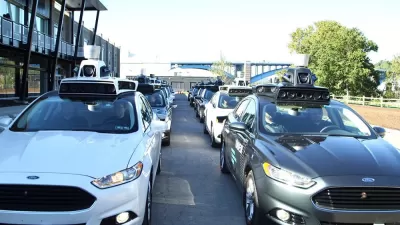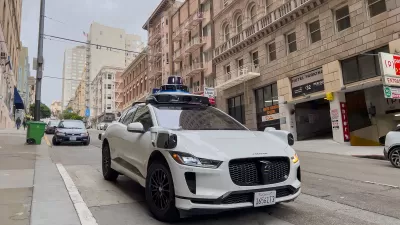Automated mobility technologies are coming. How do we ensure that they serve everyone?

Drawing upon our experience working on the Knight AV Initiative, we are pleased to share a new white paper designed to provide a foundation for public sector agencies to approach autonomous vehicle deployment and policy with a focus on equity. This paper outlines ways that public agencies can identify community needs and shape deployment to ensure that AVs will be accessible for all.
In this paper we outline our current understanding of community engagement best practices, important AV-related equity topics, different models of governance, and the tools and levers local governments have to shape deployment. The Knight AV Initiative it a a three-year collaborative effort between the Urbanism Next Center at the University of Oregon, Cityfi, Detroit, Pittsburgh, San Jose, and Miami-Dade County to pilot and learn about automated mobility technologies today to shape the future of deployment tomorrow. This work is generously supported by the Knight Foundation.
FULL STORY: Urbanism Next Center

Planetizen Federal Action Tracker
A weekly monitor of how Trump’s orders and actions are impacting planners and planning in America.

Maui's Vacation Rental Debate Turns Ugly
Verbal attacks, misinformation campaigns and fistfights plague a high-stakes debate to convert thousands of vacation rentals into long-term housing.

San Francisco Suspends Traffic Calming Amidst Record Deaths
Citing “a challenging fiscal landscape,” the city will cease the program on the heels of 42 traffic deaths, including 24 pedestrians.

Amtrak Rolls Out New Orleans to Alabama “Mardi Gras” Train
The new service will operate morning and evening departures between Mobile and New Orleans.

The Subversive Car-Free Guide to Trump's Great American Road Trip
Car-free ways to access Chicagoland’s best tourist attractions.

San Antonio and Austin are Fusing Into one Massive Megaregion
The region spanning the two central Texas cities is growing fast, posing challenges for local infrastructure and water supplies.
Urban Design for Planners 1: Software Tools
This six-course series explores essential urban design concepts using open source software and equips planners with the tools they need to participate fully in the urban design process.
Planning for Universal Design
Learn the tools for implementing Universal Design in planning regulations.
Heyer Gruel & Associates PA
JM Goldson LLC
Custer County Colorado
City of Camden Redevelopment Agency
City of Astoria
Transportation Research & Education Center (TREC) at Portland State University
Jefferson Parish Government
Camden Redevelopment Agency
City of Claremont





























